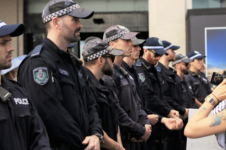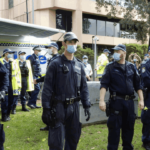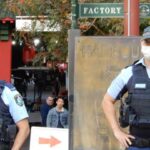Saturation Policing Focuses Once Again on Less-Affluent Regions

During the ‘dark years of COVID’, police were consistently criticised for their targeting of, and zero-tolerance approach towards, those in less-affluent suburbs of Sydney as well as regions of New South Wales who were suspected of contravening public health orders, while taking a far more hands-off approach towards wealthier suburbs and their residents.
Indeed, saturation policing of Sydney’s west and south-west became the norm during those years – with large numbers of officers descending on the areas and issuing fines or even arresting residents for non-compliance, while those in Sydney’s east and north were, for the most part, given cautions or even ignored for engaging in similar conduct.
But this is nothing new – police in New South Wales have for decades treated areas and their residents differently based on their perceived level of affluence, frequently targeting and conducting operations in suburbs and regions perceived to be less powerful and wealthy.
Operation Surge
So, it comes as no surprise that the latest saturation policing operation, labelled Operation Surge, descended last week on the state’s western regions – namely Bathurst, Dubbo, Orange and Wellington.
The high-visibility operation, which took place from Wednesday 16 to Friday 18 October 2024, saw officers attached to several Western Region Commands predominantly target men suspected of break and enter, firearm and domestic violence offences.
The operation saw officers conduct six firearm prohibition order searches, 12 personal searches and 34 bail compliance checks, resulting in the seizure of seven prohibited weapons, one unauthorised firearm, and the arrest of eight individuals who were charged with a total of 17 criminal offences.
One of those arrested was a 17-year-old youth in Dubbo, who was charged with possession of an unauthorised firearm and possessing a prohibited drug, as well as called to court for breaching his bail conditions.
Another was a 36-year old man in Orange, who was charged with two counts of stalking oe intimidation with the intent of physical or mental harm.
A third was a 51-year-old man, also from Orange, who charged with police pursuit (Skye’s law), reckless driving and possessing a prohibited drug.
And a fourth was a 41-year-old man, also arrested in Orange, who is suspected of having outstanding warrants for common assault and assault occasioning actual bodily harm.
The Futility of Saturation Policing
Even though Operation Surge has been marketed as a way of ensuring a safer society for everyone, the concern is saturation policing such as this can be counter-productive, especially when it is seen to focus on particular (less affluent) communities – creating an ‘us versus them’ mentality which is not conducive to a harmonious community.
And there is little or no evidence to suggest such heavy-handed tactics actually reduce crime, especially amongst the targeted group – which in this case was young alleged offenders.
In that regard, research conducted by Youth Justice NSW found that violent crimes involving firearms where the person was between 10 and 17 years old have already been steadily decreasing over 20 years from 2002 and 2022 – with no distinct variation during times where there is a heavy police presence – leading the organisation as well as the NSW Law Society’s Sentencing Council to conclude there is ‘no basis’ for operations of this type, let alone for increasing penalties.
In terms of domestic violence offending, the NSW Bureau of Crime Statistics and Research (BOCSAR) concluded that saturation policing has little if any impact on such offences – with domestic violence-related stalking and intimidation incidents increasing an astonishing 110% from 2012 to 2021, and court appearances increasing by nearly 64% between 2014 and 2021.
BOCSAR also found that the targeting vulnerable groups such as First Nations people has contributed to a situation whereby Aboriginal and Torres Strait Islander made up more than half of those sentenced to imprisonment in 2021.
And NSW police pursuits surged by over 70% in the last eight years, with 398 occurring in 2022 to 2023 alone.
More Police Does Not Mean Less Crime
Indeed research has consistently shown that a greater police presence does not lead to less crime.
In that regard, BOCSAR conducted a study that analysed the impact extra police had on crime and arrests, by comparing the size of the NSW Police Force in the 2000s to the crime rates as the force increased by 7.2%.
The study found no reduction in violent crimes, raising questions about the cost-effectiveness of increasing the police force. Is the cost of increasing the police force by just 1% worth the hundreds of thousands of dollars in effort? In short, the study suggests that it may not be.
Although the NSW Government has announced costly programs in the past, like the $26.2 million package to aim at intervention and prevention programs for young offenders, they might not be doing enough to justify the cost.
Other research by BOCSAR has shown that crime remains extremely high in regional areas (59% higher than in Sydney), especially amongst the younger population who are consistently re-offending.
Adding to the police force with unnecessary spending, coupled with a lack of following the proper protocol from the current NSW force, has led to multiple issues over the years with violent crime. The Review of NSW Police Force in 2023, published by the Law Enforcement Conduct Commission, noted over 100 cases where the NSW Police Force breached their protocols and failed to investigate DV cases properly.
Other shocking allegations that have led to the ever-increasing trend of violent crimes include the NSW Police Force bringing charges against their officers, including lying, neglect of duty, deficient investigation, and falsifying criminal records. Furthermore, in 171 domestic violence operating procedures breaches, there were 22 instances of failing to follow Apprehended Domestic Violence Order requirements, 44 instances of failing to collect evidence, and 53 instances of missing, incomplete, or falsified records.
Economics and Crime
Operation Surge also highlights another glaring issue in Australia — economic adversity and crime.
Studies have shown that reducing the gap between the rich and the poor in terms of an economic and social standpoint can limit the breakdown in in social bonds and reduce crime rates. long periods of deprivation in a specific area can increase criminal participation and the size of the offending population.
The Australian Institute of Criminology has theorised that delinquent cultures tend to arise out of any disparity between aspirations and legitimate opportunities for achieving such aspirations, that deprivation tends to disrupt communal bonding, and poverty weakens parental supervision.
The New South Wales Police Force needs to take economic backgrounds, and current issues (such as the affordability crisis and lack of housing), into consideration when sentencing individuals or carrying out state-wide operations.
Saturation Policing is Not the Answer
So, operations such as Surge appear to make little if any difference to crimes rates in New South Wales.
Rather, they can unfairly victimise and alienate those who reside in less-affluent communities, while the wealthy and powerful continue to disproportionately commit white collar and corporate crimes with relative impunity.
Perhaps the preferable course is to invest in the root causes of crime such as poverty, lack of access to housing and support programs, instead of pumping tens of millions of dollars every year into heavy-handed policing.






